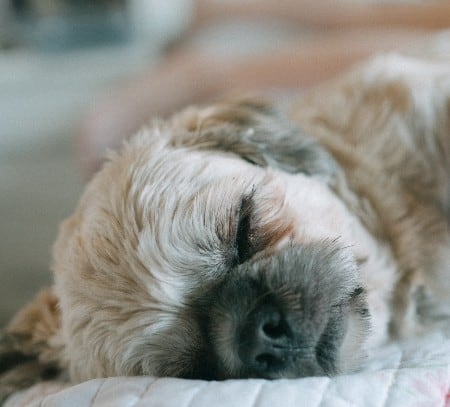We're an affiliate We hope you love the products we recommend! Just so you know, we may collect a share of sales or other compensation from the links on this page.
Is your dog in deep sleep and hard to wake up? This may or may not be a problem. Read this article to learn what you can do.
Dogs are beloved pets that bring joy, comfort, and companionship to millions of people worldwide. However, one common issue that dog owners often encounter is a dog in deep sleep that is hard to wake up. This can be concerning for owners who worry that their pet may be experiencing a health problem or that their dog is not getting enough sleep. In this article, we will explore why dogs enter deep sleep, why they may be hard to wake up, and what owners can do to help their furry friends.
Contents
Understanding Dog Sleep
Like humans, dogs experience different stages of sleep, ranging from light sleep to deep sleep. Light sleep occurs when a dog is in a relaxed state, and their muscles are still active, allowing them to quickly wake up if needed. On the other hand, deep sleep occurs when a dog is in a state of complete relaxation, and their muscles are inactive. During deep sleep, a dog’s heart rate and breathing slow down, and their body temperature drops.
Dogs typically spend around 12 to 14 hours a day sleeping, although the exact amount can vary depending on the age, breed, and activity level of the dog. Puppies and older dogs may need more sleep, while working dogs or highly active breeds may need less.
Why Dogs May Be Hard to Wake Up
There are several reasons why a dog in deep sleep may be hard to wake up. One of the most common reasons is that the dog is simply in a deep sleep cycle. As mentioned earlier, during deep sleep, a dog’s body is in a state of complete relaxation, and it may take a little time for them to become alert and fully awake. In most cases, this is not a cause for concern and is just a natural part of the sleep cycle.
Another reason a dog may be hard to wake up is that they are experiencing a health problem. For example, dogs with anemia, liver disease, or hypothyroidism may sleep more than usual and be harder to wake up. Additionally, dogs that are in pain, experiencing seizures, or have an underlying neurological condition may be harder to wake up from sleep.
What Owners Can Do
If you are concerned that your dog is experiencing a health problem that is causing them to be hard to wake up, it is important to consult with a veterinarian. A vet can perform a thorough examination and run diagnostic tests to identify any underlying health issues that may be affecting your pet’s sleep patterns.
In most cases, however, a dog in deep sleep that is hard to wake up is simply a natural part of their sleep cycle. Owners can take several steps to help their furry friends and ensure that they are getting the sleep they need.
Establish a Regular Sleep Routine
Dogs thrive on routine and having a regular sleep schedule can help them get the rest they need. Try to establish a consistent bedtime and wake-up time for your dog, and stick to it as much as possible. This can help your dog’s body adjust to a regular sleep pattern, making it easier for them to fall asleep and wake up.
Create a Calm Sleep Environment
Dogs are sensitive to their environment, and creating a calm sleep environment can help them get the rest they need. Make sure your dog’s sleeping area is comfortable, quiet, and free from distractions. Consider using a dog bed or crate to give your pet a designated sleeping space. This way they have an association with rest and relaxation.
Avoid Disturbing Your Dog During Sleep
Dogs in deep sleep may be hard to wake up. And disturbing them during this time can be stressful and unsettling for your pet. Avoid waking your dog abruptly, and instead, try to gently wake them up by calling their name or petting them. If your dog is a light sleeper, consider using a white noise machine or other sleep aid to help your dog relax and get the rest they need.
If you notice that your dog’s sleep patterns have changed or if they are experiencing other symptoms, such as excessive sleepiness or lethargy, it is essential to seek the advice of a veterinarian. With a little bit of care and attention, you can help your furry friend get the restful, rejuvenating sleep they need to stay healthy, happy, and full of energy. So, if you’re a dog owner concerned about your pet’s sleep, follow these tips and enjoy sweet dreams with your furry friend.

